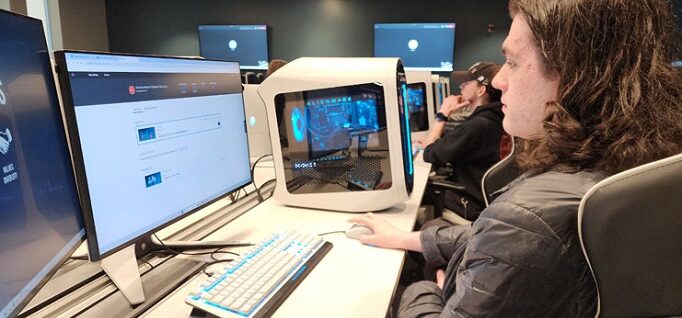Students expand cybersecurity knowledge with real-world scenario
By Chippewa Valley Technical College
April 25, 2024
Conrad Ledebuhr gave off a cool demeanor as he sat in the new computer lab used for cybersecurity training at Chippewa Valley Technical College (CVTC) on April 15.
But not too cool.
The fourth-semester IT-networking student, with six of his classmates, was tasked with first recognizing that a cybersecurity breach had been made, and then figuring out how to fix it.
“I’m cautiously optimistic,” Ledebuhr said with a smile, anticipating the challenges he and his classmates were sure to face.
Stephen Casselman, CVTC IT-networking instructor for the group, said as soon as the college purchased the CyberBit software to teach students and businesses how to manage cybersecurity threats, he decided a trial of the software would be needed.
“We’re set up to be the leading force in cybersecurity,” Casselman said. “It’s about instructors knowing that practical application and then teaching it to students and, in the future, businesses in western Wisconsin.”
But before instructors can take on the private sector, Casselman said they needed to get their feet wet.
The seven students logged into the software and waited for their custom event to begin.
Before the start at 9:30 a.m., as the IT students were anxiously waiting, Ledebuhr, 19, a graduate of Chippewa Falls Senior High School, said that’s where his love of information technology was born.
As a high school sophomore, he enrolled in a class to learn how to repair Chromebook computers. In the Chippewa Falls school district, every student uses a Chromebook at school. Teaching students how to fix the computers helps the district and allows students to learn IT skills.
“I took that class for the fun of it and figured out that I do like working the technology,” Ledebuhr said. “Then I went on to become an intern at the high school, which was largely about fixing student devices. I also got to work over the summers installing different technology and using different systems. That inspired me to go into information technology.
“And when looking at options in the area, CVTC seemed like the best bang for my buck.”
In his fourth semester, he’s preparing to enter the “real world” with this vast experience.
Just before his curtain call for the drill, he said he’s not sure if he will go into strictly a cybersecurity profession, but that even if he doesn’t, cybersecurity is everyone’s responsibility.
“It’s a world that all IT employees are inherently involved in,” Ledebuhr said. “It’s on everyone’s shoulders. Everyone who works in technology has some level of responsibility to not do the things that leave your company open to breaches.”
As he said those words, instructor Casselman deemed the drill active. Ledebuhr and his classmates dug into the scenario of a large network where a system was hacked and the website was defaced.
“They had to work as a team to discover what it was and how to recover from it,” Casselman said. “They were told to do this using the tools that people in the profession check daily in case something like this were to happen. Students had to piece information together and follow the trail.
“In many ways, it is like a digital escape room with a much more realistic scenario.”
The students worked the drill for two hours. Casselman said the students passed the overall scenario, which is a win.
Ledebuhr and his classmates applied the knowledge they gained over the last few semesters and worked together to understand the problem and determine a solution.
“The students did not have the real-world experience with an actual breach to apply to this scenario and had to learn to communicate as they worked on next steps,” Casselman said. “When communication broke down, it led to students looking at options they didn’t need or making incorrect assumptions, which ate away at their time.”
Casselman said that’s the point of the training – to learn which next steps make the most sense so the situation can be resolved as quickly as possible.
“Many professionals who do this for a living but have not worked through an incident are likely to overthink it and dive deeper than necessary,” he said. “These students now have career experience, and the scenario proved they are right in line with industry professionals.”
This article originally appeared here.



